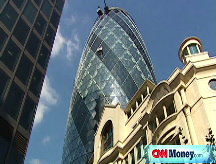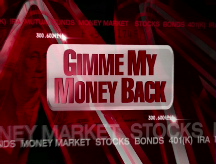Wall Street: Bracing for bad news
Dow tops 9,000 in classic late-December/early January rally. But now the harder work begins.
NEW YORK (CNNMoney.com) -- After a strong start to the new year in very light trading, Wall Street gets serious.
The weeks ahead will prove the true test, as market pros return from the holidays to digest a barrage of bad economic news, a smattering of corporate profit warnings -- and possibly a new economic stimulus plan.
But with many of the negatives factored in already and the market primed for near-term gains after 2008's battering - analysts say the advance could stretch out a few more weeks.
"In the short term, I think it's sustainable," said Paul Mendelsohn, chief investment strategist at Windham Financial Services. "Investors are looking to the inauguration, a lot of tax-loss selling is out of the way, which is massive, and the recent advance, although on light volume, has been across the board."
But beyond that, he said it's likely Wall Street will drop back down to the lows of last November, or fall even further, as the focus on the recession resumes.
Stocks have rallied over the last week, experiencing the classic Santa Claus rally, as identified by the Stock Trader's Almanac. Almanac research shows the combination of the last five trading days of one year and the first two of the next has yielded an average return of 1.5% for the S&P 500 since 1950. So far, the S&P 500 has gained 7.3%, with Monday the last day of the period.
Labor market blues: In a heavy week of economic news, this week's big standout is the government's December unemployment report, due Friday. Employers are expected to have cut 475,000 jobs from their payrolls after cutting 533,000 jobs in the previous month. The unemployment rate, generated by a separate survey, is expected to have risen to 7% from 6.7% in the previous month.
"Investors should be prepared for the worst in terms of the labor market," said Matt King, chief investment officer at Bell Investment Advisors. "The unemployment rate could rise to more than 7% this month and may go to 8%, 9%, or 10% in the year ahead."
Despite the scary numbers, King thinks investors have likely already accounted for this amid the deepening recession.
Separately, the ADP survey of private sector employment is due two days ahead of the national report and will also be in focus.
And on Thursday, the latest weekly reading on initial claims - the number of jobless who are filing for unemployment - is due out before the market opens and it is expected to continue showing steep increases.
Monday: November construction spending is due shortly after the start of trading. Spending is expected to have fallen 1.2% in November after falling 1.2% in the previous month.
Monthly truck and auto sales figures are due throughout the session.
A hearing into the Bernard Madoff scandal -- which cost investors at least $50 billion - gets underway in the House on Monday.
Tuesday: The Institute for Supply Management's survey of the services sector of the economy is due shortly after the start of trade. The December index is expected to have dipped to 37 from 37.3 in November, remaining deep in recessionary territory.
The government's November factory orders report is due around the same time. Orders are expected to have fallen 2.6% after dropping 5.1% in October.
Data on November pending home sales, a leading indicator of housing market activity released by the National Association of Realtors, is due out at 10 a.m. ET. In October, he number of homes under contract to be sold fell by a mere 1% year over year. Analysts had expected pending sales to slip by 3.6%.
Also, the Federal Reserve will release the minutes from its Dec. 15-16 policy-making meeting. At that meeting, the Federal Open Market Committee established a target range for the federal funds rate of 0% to 0.25% and said it would likely keep rates at that level for some time.
Wednesday: The House Financial Services Committee meets to discuss how the next administration might make use of the remaining TARP funds, amid criticism that the $700 billion bailout has not been working.
Also Wednesday, a House panel holds an economic recovery plan hearing that will feature testimony from some of the nation's top economists.
Thursday: The nation's chain stores will be releasing December sales reports, giving investors a better sense of how badly the consumer has been hit amid the recession.
Separately, the Fed is slated to release its monthly consumer credit report at 3 p.m. ET. Consumer credit, a measure of consumer borrowing, for November is forecast to show an increase of $0.5 billion. In October, consumer credit fell by $3.6 billion. ![]()



